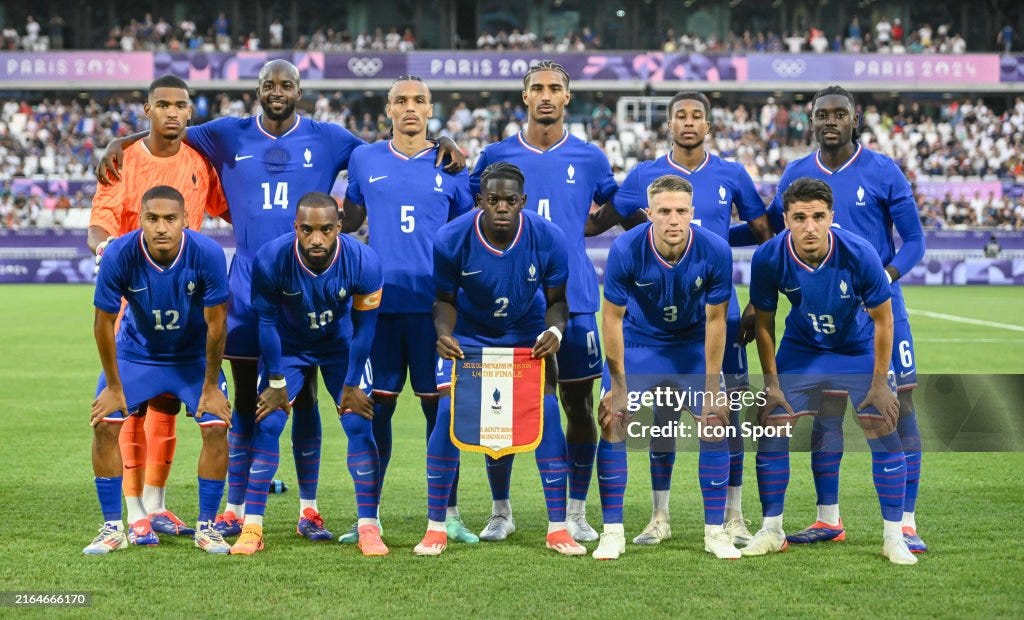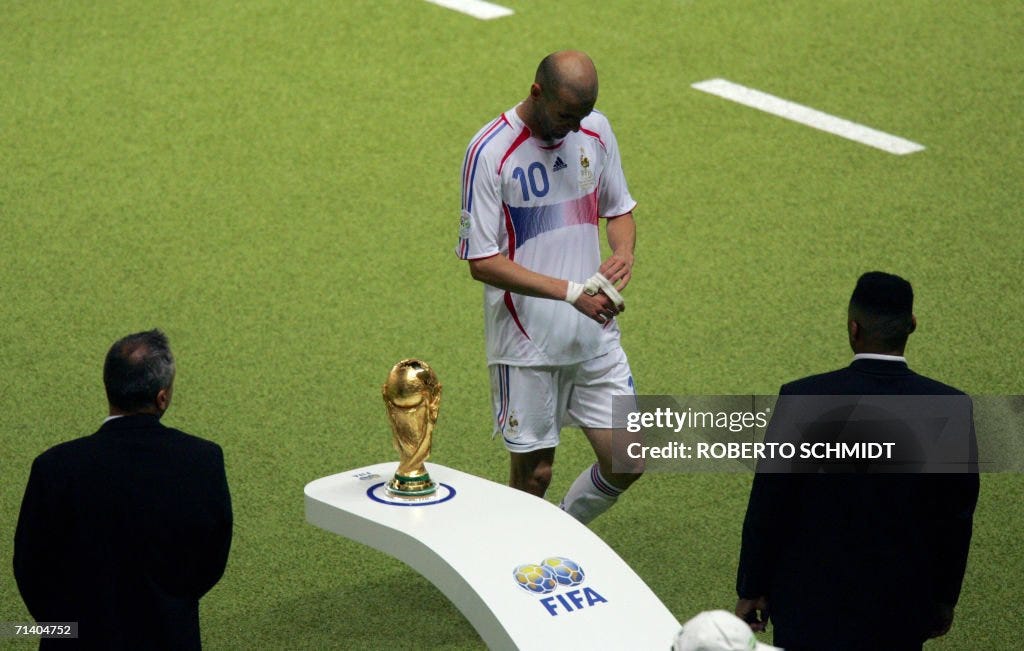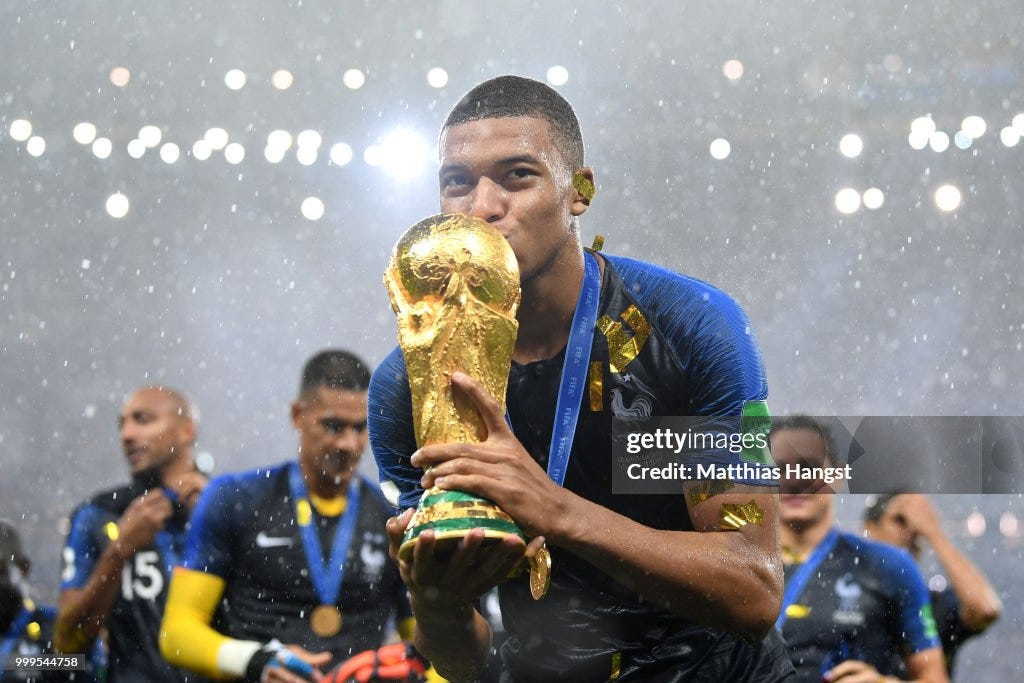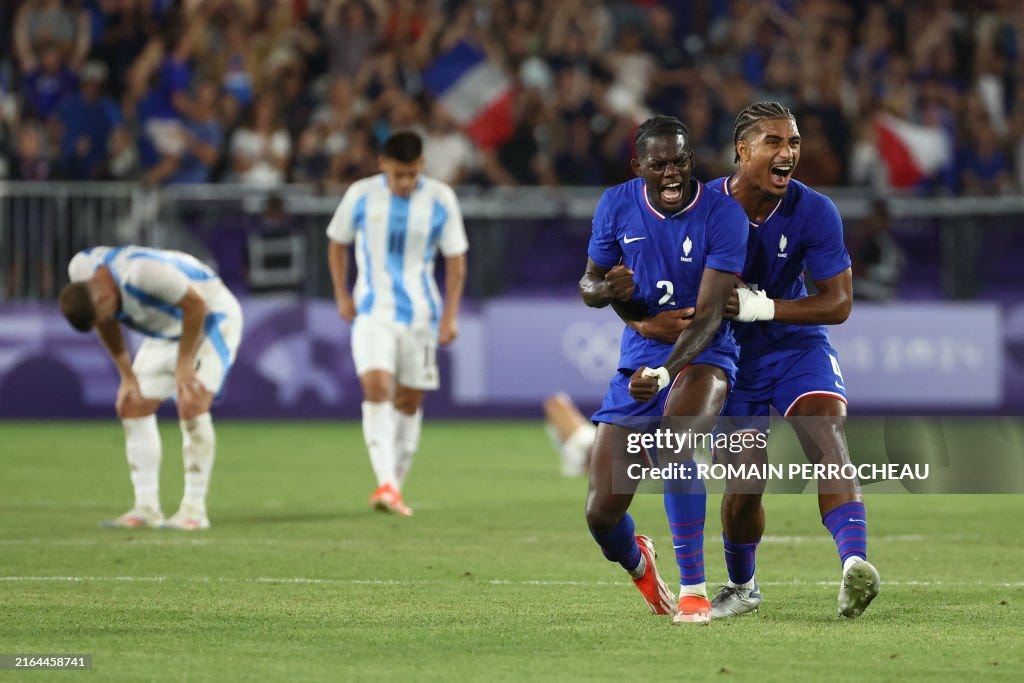OPINION: In France's 1-0 win over Argentina, no one was worried about the scoreline
France's quarterfinals victory was an important milestone in a decades-long dispute over immigration.

BORDEAUX, France — It’s the 75th minute of a brutal Olympic quarterfinals match between hosts France and world champions Argentina. France is up 1-0 thanks to a headed goal from Jean-Philippe Mateta, but Argentina is coming dangerously close to an equalizer. Argentine winger Lucas Beltrán makes a diagonal run past the French backline to latch onto a Nicolás Otamendi through-ball.
Beltrán is covered by Loïc Badé, who covers Beltran in a one-on-one situation on the edge of the box. Beltrán suddenly sprints to the byline, taking the ball with him, but in a fluid move, Badé takes five quick steps, gets beside him, and bodies him off the ball for a goal kick. An excellent, stunning display of power over a frustrated Argentine attack. But, the beautiful, majestic part of the sequence comes after the play is finished.
With Beltrán crumbled in a heap, Badé stands in front of him. He summons a deep, visceral yell, standing in front of him, staring him down. He beats his chest, greets his teammates, and pays no mind to a protesting Beltrán. The French crowd boos, jeers, and whistles. Badé is dominant.
Badé’s sudden unleashing of emotion followed not only a physical 75 minutes of football but weeks of tension between France and Argentina. It started because of Enzo Fernandez’s provocative chants after winning the Copa America in July, where he insulted French footballers for representing France over their countries of descent.
'Listen, spread the word;
They play in France, but they are all from Angola;
How nice it is! They are going to run;
They are ‘cometravas’ [somebody who has sex with transgender people] like f***ing Mbappé;
Their mom is Nigerian;
Their dad is Cameroonian.
But in the document ...Nationality: French.'
Their chants peel back decades of ignorance and racism that have plagued France. France, one of the world’s most diverse nations and a breeding ground for syncretism, has long struggled with its dark past, which includes the Inquisition and Nazi occupation. It’s a time-old debate that surrounds immigration, colonialism, and minorities. And it all starts with the 1998 World Cup.

You could see the aftermath of France’s decolonization in their national team. France’s colonial empire, like Britain and the Netherlands’, came crumbling apart after the widespread destruction of World War 2. After losing the First Indochina War and facing tensions in Algeria, France granted most of its colonies independence. France, one of the most open European countries to immigration, welcomed millions of its former subjects, where they filled in labor shortages.
Zinedine Zidane’s parents immigrated to Paris before the Algerian War in 1953. Patrick Vieira’s parents moved from Senegal to France before Vieira turned nine. It set the stage for a uniquely multicultural France. Its results were reflected in its national team.
Nine of the 22 French players in the 1998 World Cup team were either immigrants or the sons of immigrants. France earned the nickname ‘the Rainbow Squad’, the product of post-WW2 panic and relaxation on immigration. With their new, diverse teammates, including Ghanaian-born captain Marcel Desailly, France stormed to their first World Cup, beating Italy, Croatia, and Brazil to lift their first World Cup trophy.
Fans nicknamed the team Black-Blanc-Beur (Black-White-Arab), a play on the French tricolor (Blue-White-Red). Their World Cup title was not only their first in history, but a monumental victory for a French squad still grappling with their identity and shift away from a majority-Catholic nation. Newspaper Le Monde called the squad a ‘symbol of the diversity and the unity of the country.’
Jean-Marie Le Pen, far-right politician and ex-leader of the Front National (FN), has long been one of the biggest detractors of the new-look French side. Le Pen has made headlines for his defending of the Nazis, alleged war crimes, and minimalization of the Holocaust. POLITICO writer Nicholas Vinocur described Le Pen as a ‘snarling bigot, a political bogeyman who gathered up all the ugliness of France’s recent history unto himself.’
Le Pen told media that the team didn’t represent France well at the World Cup, alleging they didn’t know the words to La Marseillaise. He said it was ‘artificial’ to bring players from abroad and call them the French national team. He argued that the French team should reflect a traditional France, filled with players who can claim a fully French lineage.
The French team’s battle against the far-right has continued since, even after Le Pen was ushered out of the FN by daughter Marine. France won the World Cup with 17 descendants of immigrants, including Kylian Mbappé of Cameroonian and Algerian descent. Le Pen called the team ‘a gang of petulant kids’ who made a mockery of representing France. Even after Marine Le Pen and the FN (now the National Rally, RN) have distanced themselves from their dark background, the RN’s battle remains the same – to discredit the French team and to insult a growing, multicultural French nation.
Mbappé followed the steps of Deschamps and Henry by speaking out against Le Pen during Euro 2024. “There’s an emergency. We can’t leave our country in the hands of these people [RN],” Mbappé said in the lead-up to France’s legislative election in June.

“It’s urgent. I think that we’ve seen the results, it’s catastrophic.”
Although Le Pen hit back, saying Mbappé didn’t represent French people with an immigration background struggling against poverty, Mbappé’s words helped bring a historical collapse for the RN. Despite polling favorably in the first round of French voting, centrist and left-leaning voters allied to halt the RN’s momentum.
France stands at an uncertain crossroads – their new parliament doesn’t have an outright majority and will rely on coalitions and cooperation. Their French national team, as always, has been both a reprieve from the stressful, outside world of politics and a target for people like Le Pen.
Enzo Fernandez couldn’t have possibly envisioned all of the context he brought to the team bus after they started chanting. Fernandez, born in Buenos Aires to full-blooded Argentine parents, will likely never know the racial discrimination that Henry, Mbappé, and Badé have felt.
It’s hard to envision a multicultural Argentina, plagued by past racist policies and a desire for a ‘white Argentina’. Around 200,000 African slaves were brought to Buenos Aires in the early 1800s. Although they found a place in Argentine society after Argentina’s independence in 2018, entering politics, journalism, and more, they were slowly weeded out, generation through generation. Argentine elite wanted to dilute the African-Argentine population because of the then-popular idea that only whites could run a country, and a country full of blacks could cause barbarism.
Argentina grouped blacks into pseudo-racial categories, preventing them from getting the same privileges as white people. Blacks were encouraged to marry and have babies with white people, allowing them to earn the same privileges as white people but removing them from their heritage. Eventually, Argentina’s grand plan was to ‘unify’ their population into a ‘beautiful new white race.’ It’s only been recently – as recent as 1997 – that efforts to bring the history of Africans in Argentina to life have taken place.
So, when Fernandez chanted those songs, he was greeted by disgust from the world. He doesn’t know a multicultural Argentina because of past prevailing racial prejudices. His comments highlight the difference in how race was perceived in Argentina against the rest of the world.
Yes, Fernandez is ignorant. Yes, he is extraordinarily stupid for singing the chant with at least seven teammates at Chelsea who are French. But, he didn’t mean it with malice. He can be forgiven, especially after his personal apology to his Chelsea teammates.

So it’s here that Badé stands, a passionate player possessed by raw adrenaline and emotion. Not just because it’s a physical game, or because it’s their chance to exact revenge for their 2022 World Cup final loss. It’s also extremely unlikely that Badé and Beltrán had been lobbing insults at each other during the game. It’s a little bit about Enzo Fernandez’s insensitive comments, but more about the stress of competing with a target on his back.
Badé is of Ivorian descent. Born in a suburb of Paris to a French father and Ivorian mother, Badé is exactly the multicultural, faceted person that the RN has spoken out against. Yet, he bellowed La Marseillaise before the match. He is as French as the racists who fail to acknowledge his equality as a Frenchman.
Jean-Phillipe Mateta flicked on Michael Olise’s header in the fifth minute, curling a ball beautifully past keeper Geronimo Rulli to open the game for France. Mateta ran up to the corner flag, kicked it mid-air, and howled to the excited French crowd. He is French. He was also born in a suburb of Paris. His father is from the DR Congo, while his mother is French.
You could even say that the Black-Blanc-Beur saying of 1998 is outdated. Then, it was extraordinary to see a French team with the diversity it had succeeding on a global stage. Now, it’s commonplace. All but two of the French players who played in France’s 1-0 win over Argentina were black. Left-back Adrian Truffert, one of the two, was born in Belgium to French parents. Joris Chotard is the only full-blooded French person Le Pen will think of when talking about the French national team.
Winning a gold medal on Friday against Spain would be a huge victory for all of France, and a slap in the face to the people who don’t support a diverse, multicultural France – on the pitch and off it. Enzo Fernandez’s comments brought the issue to light and exaggerated the emotions Badé showcased, but the issue has always been underlined for the team. We might be 90 minutes and a gold medal away from solving it.



